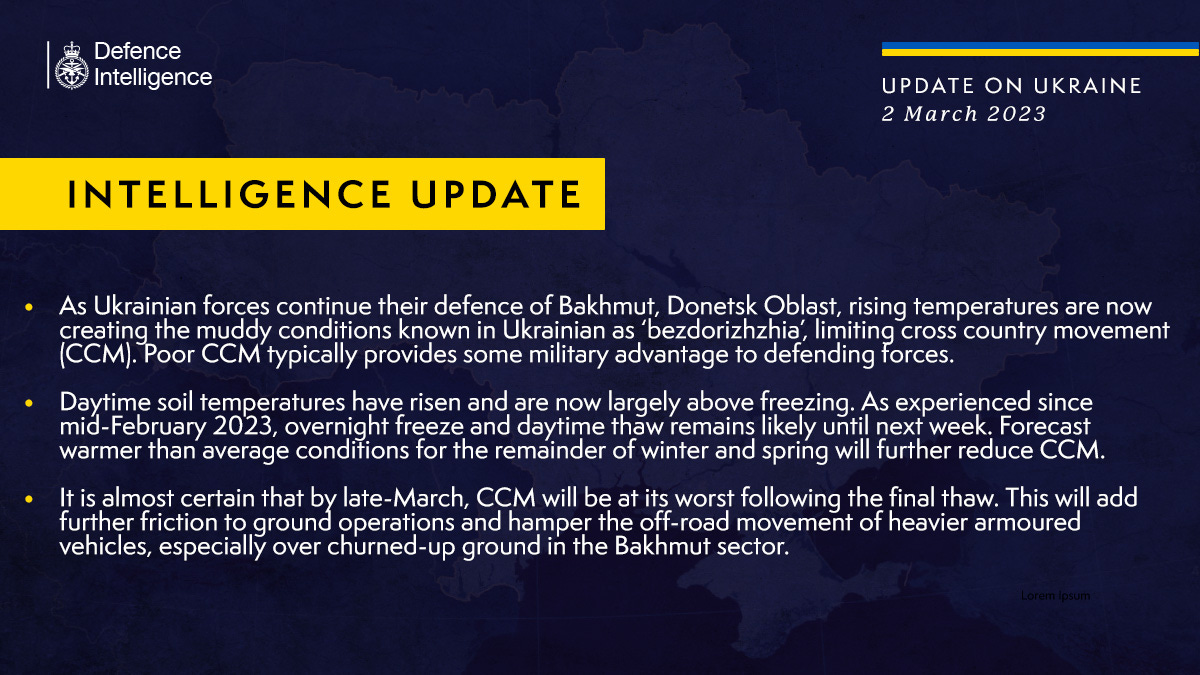Mar 2: Buonasera Mag
Day 371: Bakhmut 85RuAttacks ICC ForeignWords 40% FSB hackers Moldova MIA Blinken G20 CH EU Novak Finland CND Turkey Belarus A&Ps Nishanov ISW Lautman Aggarwal Finley Lucas Avdeeva Garfinkle Sipher
Catching up…
EA Worldview’s Ukraine Up-date- hop over to Scott’s amazing hourly Ukraine up-date page. I’ll fill in with some bits and bobs.
Bakhti Nishanov: “Confirms what we’ve been seeing consistently but anecdotally. Also, to put this in perspective: there is only 300k Tuvans in Russia and 900k Buryats. So not only these losses are relative but also for truly existential for the small minorities.”


Stories we’re following…
Russia attacked a five-storey apartment block in Zaporizhzhia overnight, killing two people, the city’s acting mayor, Anatoly Kurtev, said. Rescuers are searching for survivors under the rubble. The building was “almost completely destroyed”, Kurtev said. Among the people evacuated from the apartment block was a pregnant woman. Two people were killed, and rescuers are continuing the search for survivors.
Russian forces carried out relentless attacks on the eastern Ukrainian city of Bakhmut in their quest for a breakthrough in the war, although one U.S. official predicted few short-term territorial gains for Russia. A takeover of the city would open the way to seizing the last remaining urban centers in the Donetsk province.
President Zelensky has said: “Winter is over. It was a very difficult one and every Ukrainian, without exaggeration, felt the difficulties,” the Ukrainian president said in a video message delivered after a meeting on energy issues. “But we managed to provide Ukraine with energy and heat. The threat to the energy system remains.”
General Staff: Ukraine repels more than 85 Russian attacks over past day. Ukrainian forces repelled over 85 Russian attacks in five areas in the past 24 hours in northeastern and eastern Ukraine, the General Staff of Ukraine’s Armed Forces reported on March 1.


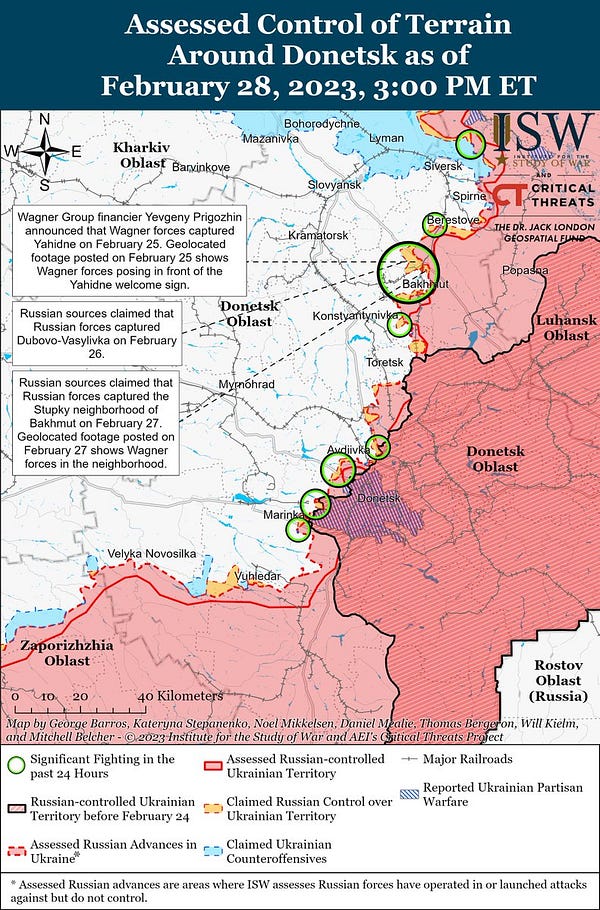
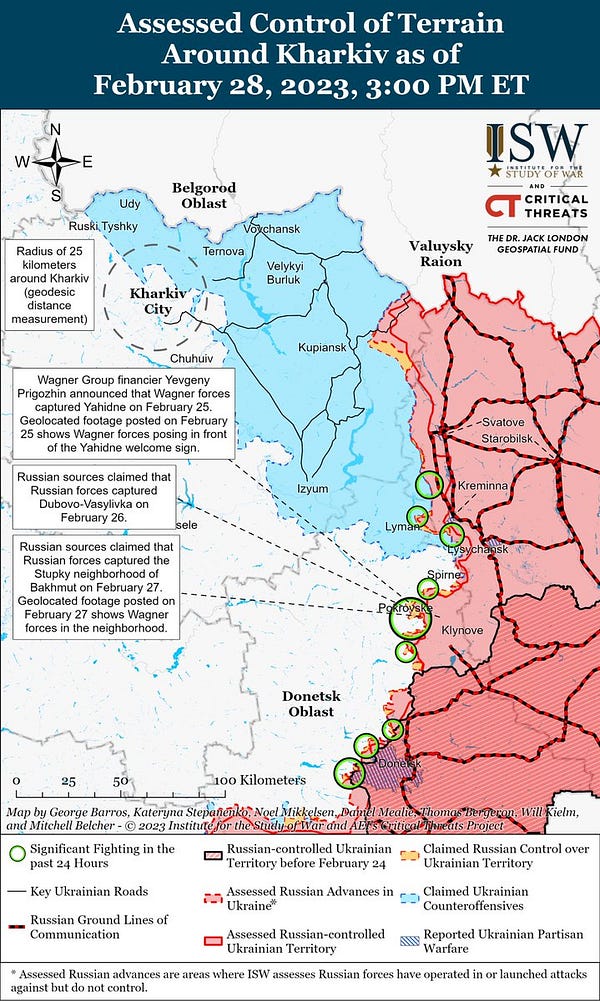

Russia has lost at least 130 tanks and armoured personnel carriers in a three-week battle in the town of Vuhledar in southern Ukraine, according to Ukrainian officials. Ukrainian officials said the “epic” fight on a plain near Vuhledar produced the biggest tank battle of the war so far and a stinging setback for the Russians, the New York Times reported.
ISW: Russia escalates false flag information operations to distract from failures. Russia appears to have escalated the promotion of the false flag information operations to downplay its failures and decrease the provision of military aid to Ukraine, the Institute for the Study of War said in its latest update on Feb. 28.
Zelensky meets with International Criminal Court prosector in Kyiv. President Volodymyr Zelensky met with International Criminal Court (ICC) Prosecutor Karim Khan in Kyiv on Feb. 28, the Office of the President reported. During their meeting, Zelensky stressed that the Russian crimes committed in Ukraine must not be overlooked, and those responsible for them must face legal consequences.
Europe’s chief prosecutor Laura Codruta Kovesi has told Agence France-Presse she wants to go after people undermining sanctions against Russia. The European public prosecutor’s office is charged with probing any offence deemed to have cost the EU money, which often means tracking international crime gangs and sophisticated cross-border VAT fraud operations.


Russian media: Drone that fell near Moscow carried explosives. Russian newspaper Izvestiya reported on March 1 that law enforcement agencies had found an explosive device after examining a drone that had crashed near the village of Gubastovo, Moscow Oblast.
Russia’s revenues from oil and gas exports dropped by nearly 40% in January as price caps and Western sanctions squeezed the proceeds from Moscow’s most lucrative export, the International Energy Agency said on Tuesday. Russia’s oil and gas export revenues were $18.5 billion in January, 38% lower than the $30 billion Moscow received in January 2022, a month before its invasion of Ukraine, according to IEA numbers shared with Reuters.
Putin has said he is preparing for an upcoming visit by China’s president, Xi Jinping, in Moscow, Russian state media reported. The Russian leader said he planned to show the Chinese delegation the Moscow metro’s Bolshaya Koltsevaya line (Big Circle Line) during their visit to the Russian capital. A Russian division of China Railway Construction Corporation Limited (CRCC) was involved in building a section of the metro line, state-run Tass news agency said.
Putin told the FSB domestic security service on Tuesday to step up its activity to counter what he said was increasing espionage and sabotage against Russia by Ukraine and the West. In a speech to officials, Putin said the FSB had to stop "sabotage groups" entering Russia from Ukraine, step up protection of infrastructure, and prevent Western security services reviving what he called terrorist or extremist cells inside Russia.
The Moscow Times: Russian authorities said Tuesday that several regional television and radio stations that have recently broadcast air raid alerts had been breached by hackers. "As a result of hacking of servers of radio stations and TV channels, in some regions of the country, information about the announcement of an air raid alert was broadcast," Russia's emergencies ministry said in a statement. The emergencies ministry said a similar cyber attack last week triggered air raid sirens across Russia. The hacks targeted only private radio and television stations. The breaches came shortly after the first anniversary of Russian President Vladimir Putin's decision to send troops into Ukraine in February last year.


Russia’s wartime casualties in Ukraine include a large class of personnel who are missing. Most of these troops have likely been killed, but their families can neither get ahold of their bodies nor file for the compensation promised by the state. Often, they try to find their loved ones through dedicated social media groups, and by querying hospitals, morgues, and the Defense Ministry. Novaya Gazeta Europe has analyzed 9,905 posts on the popular social network VKontakte (VK), discovering references to 1,365 Russian troops whose relatives are fruitlessly trying to locate them.
Interfax: Russia wants to increase the penalty for "discrediting any participants in the special military operation" to up to seven years in prison. The amendments are published in the Duma database. It was reported that the amendments were prepared in the Duma Committee on Security and Anti-Corruption on behalf of Volodin , and the speaker responded to a corresponding request from the head of Wagner PMC Yevgeny Prigozhin.
National Police block channels promoting violent Russian-linked youth movement. National Police reported on Feb. 28 that they had blocked access to 18 online channels and groups connected to a violent subculture targeting Ukraine's youth.
Recruiters on social media seek attendees for “concert-rally” to mark ninth anniversary of Crimea annexation, promising speech from Putin on March 18.
Valery Fadeyev, chairman of Russia’s Human Rights Council, is calling for a new law that would criminalize “Russophobia.” “Our task is to try to come up with a legal definition of ‘Russophobia’ and with a list of applicable criminal law articles,” Fadeyev said, adding that if the criminal law does not contain a suitable provision, it should then be drafted.


The G20 will see US secretary of state Antony Blinken and Russian Foreign Minister Sergei Lavrov in the same room for the first time since July, but the two men are unlikely to hold talks, AFP reports. India’s longstanding security ties with Russia have put the host of Thursday’s meeting in an awkward diplomatic position after refusing to condemn the invasion over the past year.
The war will play a big role at the G20 foreign ministers meeting, but host India is confident that economic challenges created by the conflict will get equal attention. The event is held days after a meeting of finance chiefs of the bloc, where they wrangled over condemning Russia, failed to reach a consensus on a joint statement and settled instead for a summary document.
Bloomberg: China imports Russian uranium, raising concerns over the nuclear arms race. China’s imports of Russian uranium will fuel a new reactor, creating weapons-grade plutonium as a byproduct, according to a Bloomberg article published on Feb. 28.
Report: Western-made parts are used in Russian weapons involved in war crimes. Western technology companies continued to export dual-use and specific military components to Russia as late as November 2022, according to a new report released by International Partnership for Human Rights and the Independent Anti-Corruption Commission. The report examined multiple war crimes allegedly committed by Russian troops in Ukraine, suggesting that Western-made parts were used in weapons involved in each crime.
The EU Commission wants to switch Europe from times of peace to times of war: According to SPIEGEL information, a three-stage plan envisages a massive increase in ammunition production. Ursula von der Leyen's authority wants to present the member states with a plan that will not only ensure the supply of Ukraine in the defense against the Russian invasion, but also the replenishment of stocks in the EU countries.
Hungary’s president, Katalin Novák, urged lawmakers to ratify Finland and Sweden’s Nato entry “as soon as possible”. “It is a complex decision, with serious consequences, so careful consideration is necessary,” Novák said on Facebook. Hungary and Turkey are so far the only two Nato countries not to ratify their admission.
Germany will ramp up ammunition production as well as ensure it has enough replacement parts and repairs capacity in its defence industry to better support Ukraine, the chancellor Olaf Scholz has said. The German leader vowed on Friday to support Ukraine “as strongly and as long as necessary”, adding that German aid to Ukraine, for financial and humanitarian support as well as weapons, had totalled more than €14bn (£12.4bn) so far.
US Cyber Command – and the broader DOD intelligence apparatus – are working to develop and build out foundational cyber intelligence. “We have a workforce of amazing all-source analysts, but they’re kind of like me, political science majors, and I need some that are really in the nuts and bolts, they can get down to understanding hardware, software,” Col Frost said. “We’ve got to build that workforce and then combine those together to build this Cyber Intelligence Center. That is our future vision of what we’re seeing going forward.”
The death toll in Turkey from last month's devastating earthquake has risen to 45,089, the Disaster and Emergency Management Authority said, bringing the total toll including Syria to about 51,000. We took a look at how Turkey has been rattled by thousands of aftershocks.
Canada has followed the European Commission, the United States, and Denmark by banning TikTok from government devices. Rome is also considering the ban. The social media app TikTok has become a dominant force, especially when influencing teenagers. But over these past few weeks, there have been growing concerns for many Western governments over the platform’s Chinese ownership.
NYT: Eli Lilly said it would cut the price of insulin, capping the monthly out-of-pocket cost of the lifesaving drug at $35. It comes after years of mounting criticism from Americans who have said the drug should be more accessible.

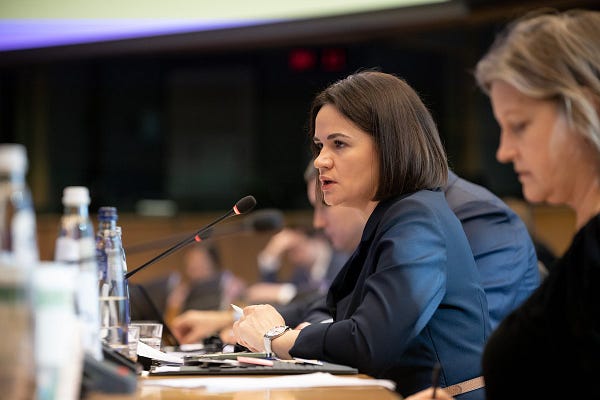


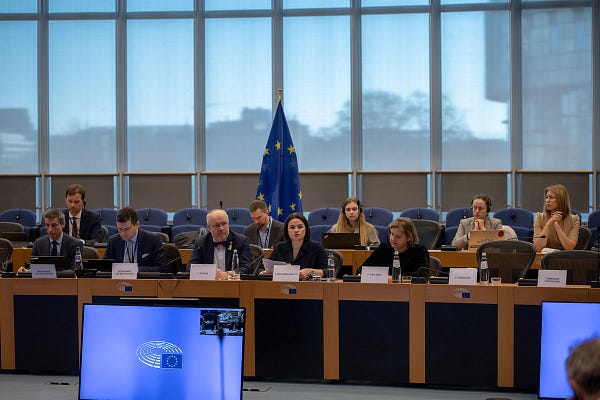
Mithil Aggarwal, What could Chinese artillery and ammunition mean for Putin's war in Ukraine? NBC News
China is considering sending Moscow ammunition and artillery, according to U.S. officials, which could be particularly crucial as the war grinds into a second year with the front lines likely to be dominated by brutal artillery duels.
Beijing has accused the United States of "disinformation" over the claims and said Washington should stay out of its relationship with Moscow. But it may be well-equipped to support Russia's military should it choose to do so, experts said.
With Russia engaged in a new offensive in the eastern Donbas region, China’s existing stockpile of old artillery and ammunition — some of which is Russian made and could be readily used — might give Russia’s army the breathing room to keep fighting a war that has already lasted much longer than the Kremlin had planned.


Edward Lucas, No Backslapping While Ukraine Bleeds- CEPA
As the economist Adam Tooze points out in the Financial Times, the cost of the war in the West has been trivial by the standards of past military adventures. The United States has so far spent 0.21% of its GDP on Ukraine — rather less than the average it spent annually on its botched engagement in Afghanistan. During the first Gulf War in 1991, Germany offered three times more to help the allies evict Saddam Hussein’s Iraqi occupiers from faraway Kuwait than it is providing in bilateral aid to Ukraine now.
Why is the West so hesitant? One theory is that we fear Ukrainian victory. We will supply only enough money and weapons so that Russia does not win, and not enough to ensure that it loses decisively. Such a cynical approach could not, I think, be kept secret among the governments concerned for so long.
More likely is that the West lacks political and economic capacity. We wish the ends, but not the means. Our military stockpiles are too skinny. Vladimir Putin is willing to switch Russia to a war economy and take huge hits to living standards and long-term growth. We are not.
The big question is whether this is just a temporary failure of political will, or something deeper. Ukrainians hope that the logic of events and their own lobbying will eventually produce the needed help. A gloomier interpretation is that Western political systems, faced with huge problems—climate change, the north-south injustices of the world economy, and the threat of pandemic diseases—simply lack the necessary decision-making capability. We are similarly helpless against the global axis of autocracy now taking shape between Beijing and Moscow via Tehran.
We will see. But what is clear is that while we dither, Ukraine bleeds.


Adam Garfinkle, The Age of Spectacle, Part II- The Cosmopolitan Globalist
After The Spectocracy appeared here, readers’ comments were divided. Some thought that of my three main drivers of the Age of Spectacle—mass affluence, deferred myth maintenance, and the erosion of deep literacy—only deep literacy erosion was significant; others said the opposite: deep literacy could not matter much since it had never been widespread.
My short introduction omitted some caveats, to wit: Mass affluence and the failure of myth maintenance are necessary for a massive and rapid erosion of deep literacy. This in turn is critical mainly in its impact on cultural, media, and political elites. But the biggest punch comes from the substitution of a new form of cyber-oral culture for deep literacy. It’s true that American society has never had more than a small minority of deeply literate people, but the rise of this oral culture is new, and its broad neurocognitive impact is unprecedented.
The evidence lies in the timeline. The madness in our politics has closely followed new cybernetic intrusions upon our culture. The iPhone first hit the market in June 2007, right in time for the Great Recession. By February 2011, Facebook was the largest online photo host. In late 2013, the iPhone hit market saturation. By 2016, we were in the age of Pizzagate, Frazzledrip, and QAnon.
Here I will define what I mean by spectacle. The next installment will present the neurocognitive evidence in support of my definition. The fourth will explain why we must appeal to mass affluence and failed myth maintenance to account for our troubles. The fifth will examine the impact upon our elites of the displacement of deep literacy by oral culture. The sixth and last will take a step back to look at the trajectory we have described.






